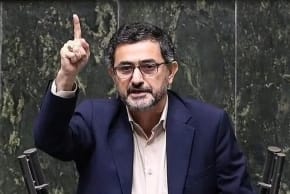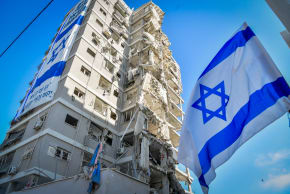Israel Iran War
IDF's Farsi-language account urges Iranian dissidents for contact
"We ask patriotic Iranian people to please follow only our official contact channels and get in touch with us for any kind of cooperation," the IDF's official account in Farsi posted.


Araghchi slams US-Israeli Miriam Adelson, accusing her of dual loyalties in antisemitic trope
After shooting down Iranian ballistic missile in June, David's Sling carries out new drills

Iran arrests at least four reform front politicians
Iran’s Araghchi: Missile program ‘defensive,’ forever off the table for negotiations
"The missile issue is purely defensive” for the Iranian regime and “cannot be negotiated, neither now nor in the future,” Araghchi asserted.

Forget Iran nukes, terror proxies - for Israel, it's all about ballistic missiles now - exclusive
IDF chief ready to strike surprising targets if Tehran chooses war • Eyal Zamir made case against ballistic missiles directly to US military officials in Washington

Iranian MP threatens US bases, urges Jordanians to seize control of air base amid rising tensions
Iranian MP Mojtaba Zarei urged Jordanians to seize the Muwaffaq Salti Air Base and take US soldiers captive after Tehran strikes the base in a threatened upcoming ballistic missile attack.

Israelis divided on joining US pre-emptive strike on Iran, ending US military aid - IDI poll
Israelis are divided on Iran, US military aid, and Netanyahu’s role in Trump’s Gaza Board of Peace, according to a new Israel Democracy Institute survey.

WATCH: Iranian Mossad agent discusses anti-regime role during June's Israel-Iran war
The agent, known as "Arash," spoke to Channel 12's Uvda about the role he played as "Mossad's eyes" during an operation within Iran to destroy a ballistic missile launcher aimed towards Israel.

Iran's Shamkhani warns of ‘immediate, unprecedented’ attack on Tel Aviv in event of US strikes
Shamkhani wrote that a “limited strike is an illusion,” adding that any US military move, “from any source and at any level,” would be treated as an act of war.

Turkey's foreign minister says Israel still seeking opportunity to attack Iran
"I hope they find a different path, but the reality is that Israel, in particular, is looking for an opportunity to strike Iran," Fidan said in a televised interview on Friday.

Iran's crisis will not last forever - Israel and the world have a real opportunity - opinion
Iranian instability and potential US action create a critical moment for Israel to strengthen its regional position within the Middle East.

Israel nearly struck Iran twice in recent weeks, former IDF intelligence chief claims
Recent near-escalations were the result of miscalculation risks, which in turn strengthened military cooperation between US and Israel, Tamir Hayman said.

Iran opens door to preemptive strikes on Israel, US as response to nationwide protests
Iran's National Defense Council issued a statement that warned that any encroachment on its security or national integrity would be met with an “appropriate, targeted, and decisive response.
